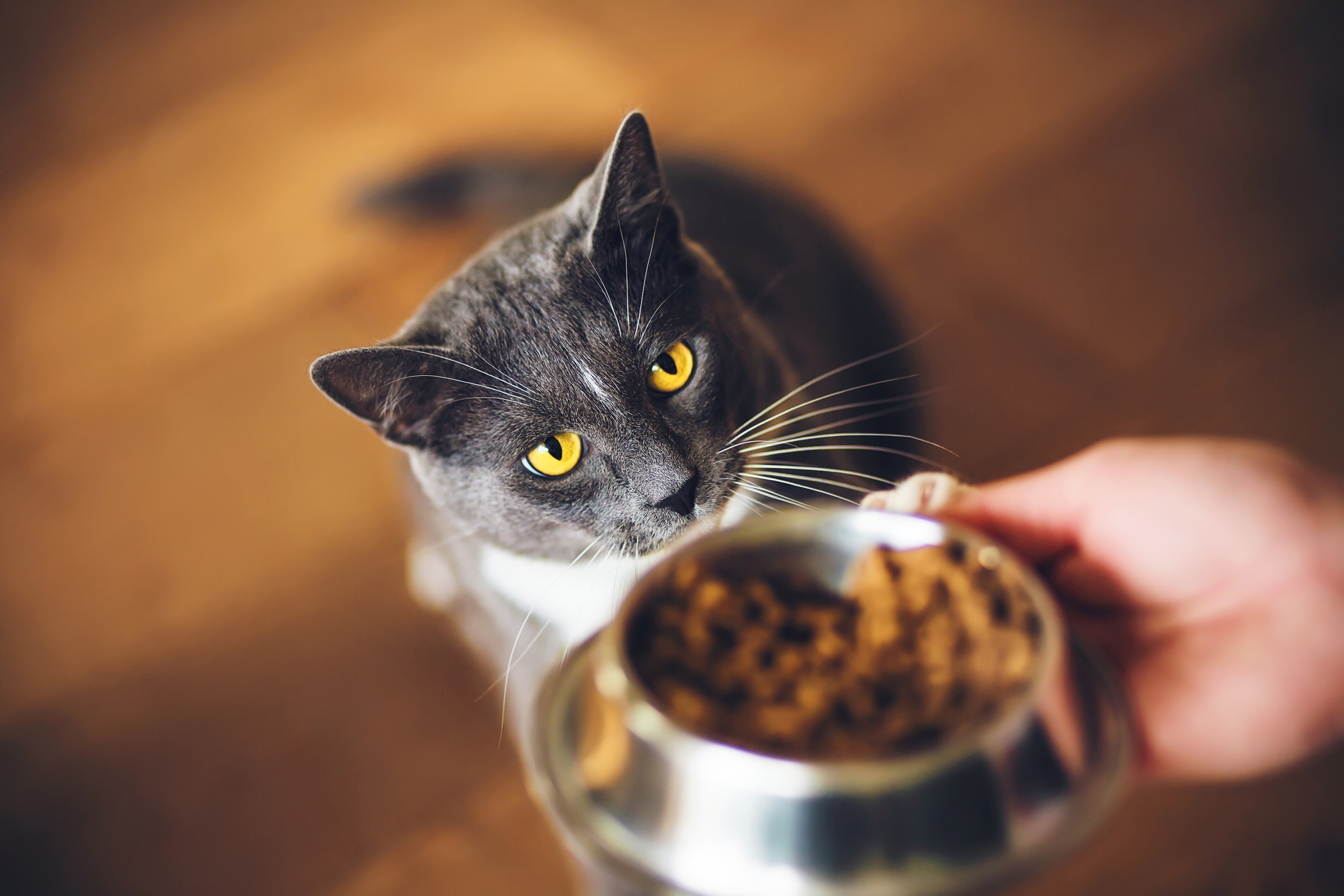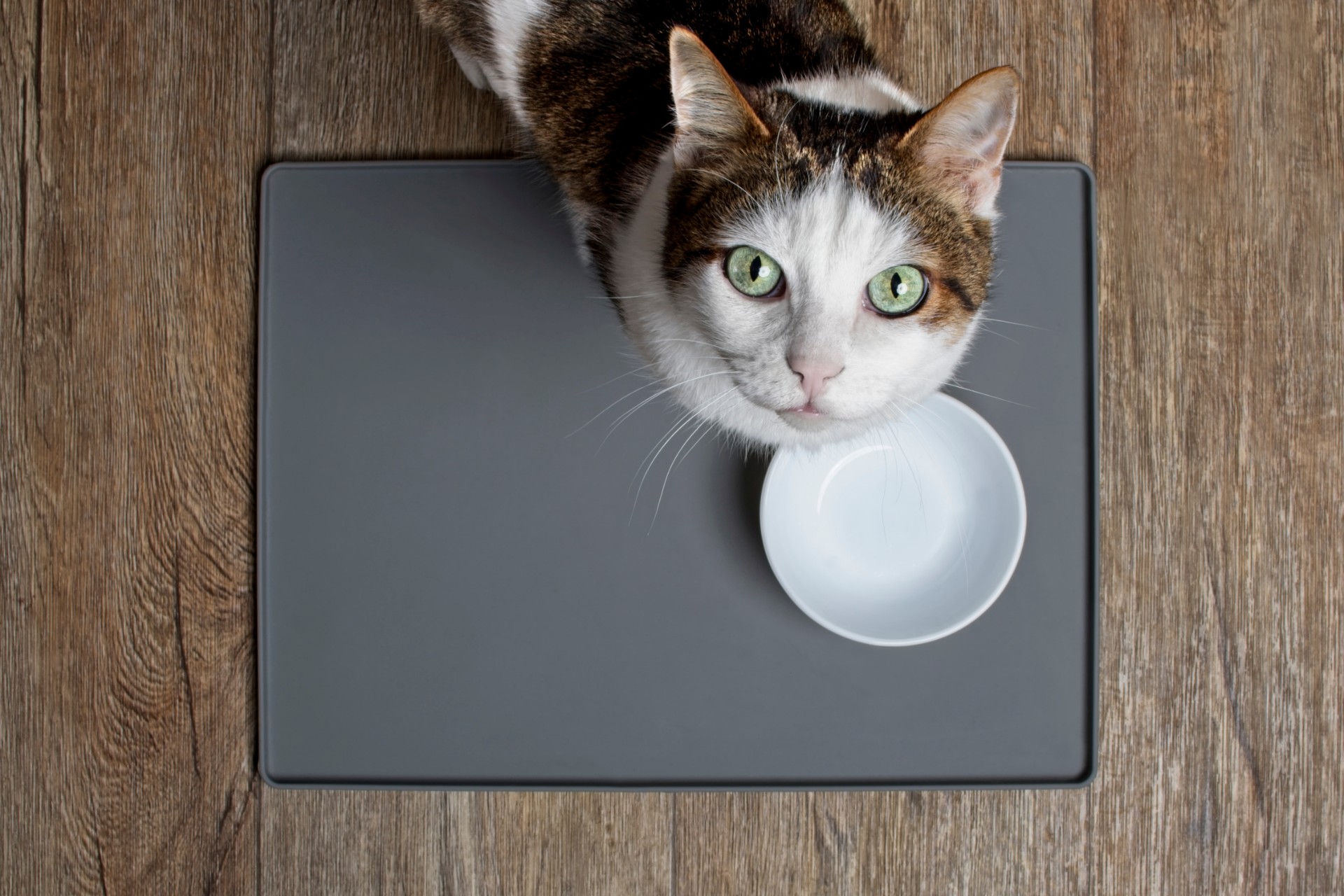Is your kitty too skinny? Cats may be underweight for a number of reasons, including anxiety, medical problems, age, and picky eating habits. Whatever the issue is, it’s important to help your cat become healthier and increase their weight. If you’re wondering how to get a cat to gain weight, keep reading below!

Why your cat is too thin
Cats may be too skinny for two main reasons: They either aren’t eating enough or they are burning more calories than they are taking in. The cause may be behavioral, medical, or age-related. Here is a more in-depth look at why your kitty may be too slim.
- Not enough food: If your cat is not eating enough, they will shed a few pounds. Cats will cut down on mealtime for a few reasons. Picky eaters may not like the food you are serving them. Competition from other cats or pets may prevent them from reaching the food bowl. The bowl may be inaccessible to them. Dental and mouth problems may make eating painful. Stress can also cause your cat to stop eating.
- Old age: As cats get older, they can experience a decline in digestive function. Because of this, some senior cats, 10 years old and older, have difficulty maintaining their weight.
- Hyperthyroidism: Some older cats develop hyperthyroidism, causing their glands to make an excess of the thyroid hormone. This hormone boosts the metabolism and causes calories to burn off more rapidly. As such, weight loss is one of the most common symptoms of this disease.
- Diabetes: Despite having a healthy appetite, cats with diabetes lose weight quickly. The condition prevents cats from efficiently processing and using the calories they consume.
- Gastrointestinal issues: Gastrointestinal problems like parasites, inflammatory bowel disease, and pancreatitis can inhibit your cat’s ability to digest food and gain the nutrients they need. This, too, can lead to weight loss.
- Tumors: Both benign and malignant tumors can cause your cat to drop some pounds. The cancer cells consume the calories your cat needs to remain healthy, resulting in weight loss.

Healthy weights for cats
Just like humans, there is no ideal weight that applies to every cat. Weight can vary depending on a cat’s gender, breed, bone structure, and whether they have been neutered or spayed. According to the Association for Pet Obesity, a domestic cat should weigh between 8 and 10 pounds. Other cats may weigh more or less depending on their breed. A Siamese cat can weigh between 5 and 10 pounds, whereas a Maine coon can be anywhere from 10 to 25 pounds.
Often, you can determine if your cat is their ideal weight by looking at them. If your cat is underweight, you’ll notice a slim waist and prominent ribs, spine, and shoulder blades. If your kitty has long fur and you can’t determine their weight by look, you can check by feel. Stand behind your cat and gently move your hands down your cat’s back with your thumbs on their spine and your fingers over their ribs. If they are underweight, you will easily be able to feel a lack of fat on their ribs and back, as well as their rib bones and spine.
How to help your cat gain weight
Before you can help your cat, it’s key to figure out why they are so skinny.
Eliminate medical issues
The first step is to rule out medical problems. Schedule an appointment with the vet to discuss your concerns and determine if the weight loss is due to a medical issue. If there is a medical reason for the weight loss, they will develop a treatment plan for your cat. If there is no underlying medical condition, there are a few tricks you can try to encourage your kitty to gain a few pounds.
Offer plenty of quality food
Ensure your cat is eating enough food. Cats prefer to graze and eat small meals throughout the day; leave the food bowls out all day long and give the cat free access to them. You can also purchase specially-formulated food to help your cat gain weight. Look for high-calorie food with lots of protein. Older cats may benefit from switching to a super-digestible food full of antioxidants, prebiotics, and omegas 3 and 6. You can also offer high-calorie treats throughout the day to supplement their meals.
Create tasty meals
Make their food more appetizing. Cats are famously picky eaters, so it can take some trial and error to find a formula they’ll love. If you are feeding your cat dry food, give them wet food too. You can also add some cooked chicken, tuna, unsalted chicken broth, or a cat food topper to their food to make it more aromatic and appealing.
Reduce their stress
If stress prevents your cat from eating enough, try to find the cause of their anxiety and eliminate it. Make sure the food bowl is not near something that may be scaring them, like a loud air conditioner or barking dog. If another animal is blocking the bowls and preventing them from eating, consider placing a second bowl in a safer, less-threatening environment.
For cats, being too skinny can be a sign of a medical condition, stress, or a behavioral issue. By using the tips above, you can figure out if your cat is underweight, what may be causing it, and what you can do to help them pack on the pounds. In no time, your cat will be happy and healthy once again!



